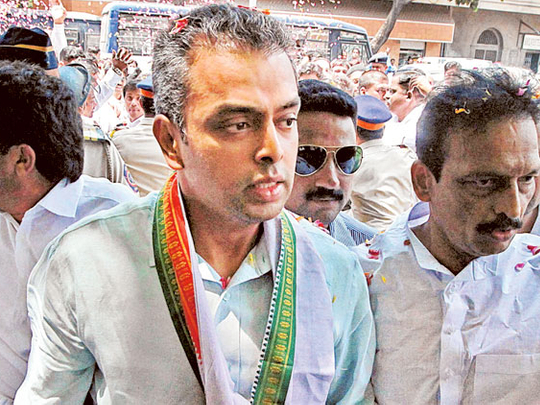
New Delhi: India’s political parties may have been harping on dynastic politics of the Congress Party, but many are in a position to make it an issue.
Running for the first time in this year’s elections are sons and daughters of several veteran leaders across all political lines.
The trend that began with the Nehru-Gandhi family in New Delhi and the Abdullahs in Jammu & Kashmir, soon caught the fancy of the Chautalas in Haryana and the Scindias in Madhya Pradesh. Over the years, the list has only become longer.
Rajesh Pilot’s son Sachin, Mulayam Singh Yadav’s son Akhilesh, Biju Patnaik’s son Naveen, Jitendra Prasad’s son Jitin are all following their fatherss footsteps. So is Murli Deora’s son Milind, Digvijay Singh’s son Jaivardhan, Ashok Gehlot’s son Vaibhav, Sunil Dutt’s daughter Priya, Ajit Jogi’s son Amit, Tarun Gogoi’s son Gaurav and Chandrababu Naidu’s son Nara Lokesh.
The first-timers in the Lok Sabha elections include: Yashwant Sinha’s son Jayant, Pramod Mahajan’s daughter Poonam, Palaniappan Chidambaram’s son Karti, Lalu Prasad’s daughter Misa, Ram Vilas Paswan’s son Chirag, Sahib Singh Verma’s son Parvesh and Ajay Chautala’s son Dushyant.
So, as their own children now follow them, many leaders, who earlier spoke against the Nehru-Gandhi family, have had to chew their words on finding themselves in a similar position.
But to the discomfort of the BJP, in a recent rally, its prime ministerial candidate Narendra Modi vowed to end dynasty politics, without realizing the growing trend within his own party.
He appealed to the gathering to ‘Vote for India’ in the Lok Sabha elections and free the country from dynasty and nepotism, unaware that sons of BJP party president’ Rajnath Singh, Chhattisgarh chief minister Raman Singh, Himachal Pradesh chief minister P.K. Dhumal and former Karnataka chief minister B S Yeddyurappa, are all in the fray.
Confronted with the facts, a BJP member remarked, “Sons of all these leaders are ‘dedicated workers’, unlike family members who are ‘accommodated’ in parties such as the Congress and the Samajwadi Party.
Suddenly singing a different tune, senior party leader Balbir Punj also said that the party had initiated a generational shift.
“It is a natural process, as many new faces have been given chance to contest elections,” Puns said.
An RSS (Rashtriya Swayamsevak Sangh) leader was also on the defensive: “It cannot be called dynasty politics because these people are capable of winning elections on their own.”
But is dynastic politics all that bad?
Political analyst Vibhor Gupta remarks, “No one raises a brow when the children of film stars, doctors, engineers and civil servants follow their parents’ career choices. Though it won’t be wrong to say that in the case of a majority of the candidates, their surname is their political brand, but then they have to prove themselves.
“Gone are the times that families voted for parties or dynastic families from generation to generation. So, as in any other profession, it is not correct to deny the children of politicians the legitimacy in the event of their getting elected democratically.”
The present scenario reflects the fervour at the local level. Younger candidates joining the poll fray are believed to be bringing with them a new wave of hope. And there’s great anticipation about first-time entrants, who are considered smarter, educated and with innovative ideas that can take the country towards a better future.
“Brought up in a [conducive] environment, these candidates take to politics like fish to water. This is unlike many, including celebrities, who win the elections, but fail to work for their constituency. Dynasty can only help in entering politics, but they have to win the hearts of the people,” Gupta felt.
“There is no denying the fact that India needs radical thinking youngsters at all levels of governance. And also qualified people, who will make technology work for the benefit of people at the grassroots level. Since the new crop of politicians is relatively wealthy, they are expected to have decision-making abilities to not frame policies for personal gains, but for the public,” he added.












